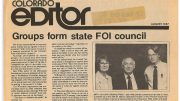By Jeffrey A. Roberts
CFOIC Executive Director
After months of work by stakeholders, proposed 2017 legislation is taking shape that would modernize the Colorado Open Records Act and provide an alternative to litigation for resolving CORA disputes.
Despite the progress, however, a formidable roadblock surfaced Friday when the Colorado Attorney General’s office announced that it will not support the most recent bill draft.
“We think the bill … creates more problems than it cures” and will make CORA “more complicated and more vague,” Chief Deputy AG David Blake wrote in a statement read aloud during a meeting of the CORA Working Group.
 The working group, chaired by Deputy Secretary of State Suzanne Staiert, includes journalists, lawyers, citizen watchdogs and representatives from various state agencies, public universities and local governments. The Colorado Freedom of Information Coalition has had a seat at the table for both the CORA Working Group and a supporting “technical” subcommittee.
The working group, chaired by Deputy Secretary of State Suzanne Staiert, includes journalists, lawyers, citizen watchdogs and representatives from various state agencies, public universities and local governments. The Colorado Freedom of Information Coalition has had a seat at the table for both the CORA Working Group and a supporting “technical” subcommittee.
The talks sprung from the defeat last spring of SB 16-037, a proposal to update CORA for the 21st century by requiring that Colorado governments provide digitally stored data “in a machine-readable standard format routinely used by the official custodian.”
That bill, introduced by Sen. John Kefalas, D-Fort Collins, was intended to solve a problem faced by requesters of public records in Colorado: Database records sometimes are released in formats (paper or PDFs) that make analysis difficult. And governments sometimes withhold entire datasets that contain confidential fields of information, such as Social Security numbers. Instead of redacting private portions and releasing the rest, some records custodians say they are not required by law to “create a new record.”
Some critics of SB 16-037 said it didn’t adequately address issues such as cost recovery for government entities, the protection of confidential information and what will – and won’t – be required of records custodians when they get requests for records kept in databases and spreadsheets.
The proposed 2017 legislation specifically addresses these concerns while also clarifying that records kept as structured data or in other searchable electronic formats can be requested in similar formats. It also clarifies that the altering of an existing public record to excise confidential fields of information does not constitute the creation of a new record under CORA.
In exchange for such new language in CORA, government entities received assurances they won’t be burdened with extra costs or required to make copies of databases if they aren’t technologically able to do so.
The 2017 proposal also would establish a three-year trial period for resolving open-records disputes through mediation. In Colorado, unlike in many other states, going to court is now the only legal remedy afforded records requesters who believe that a government or agency has violated the open-records law.
The bill would incentivize records requesters to try mediation by making it extremely difficult to recover court costs and attorney fees if they head to court right away. If requesters try mediation, and it doesn’t work, they would still recover some costs if they prevail in court. But if they don’t try mediation and prevail in court, the recovery of costs and attorney fees would be tied to a hard-to-prove finding that a records denial was “arbitrary and capricious.”
In his statement Friday, Deputy AG Blake wrote that his office has “zero doubt that if passed as drafted, (the bill) will result in an increase in litigation.” Although he “does not disagree with the policy behind the mediation piece,” Blake contended that the bill “fundamentally changes the balanced incentive structure CORA has struck.”
“We don’t believe this bill accomplishes the stated goal of resolving disputes out of court. In fact, the mediation system as drafted, we believe, will likely add another level of bureaucracy without any significant benefit.”
Blake didn’t cite specific aspects of the digital records portion of the bill but complained that it doesn’t “adequately address that issue and is more problematic.” He wrote that “CORA should be modernized to keep up with the technological realities of today’s world, but we think the bill that has come out of this working group creates more problems than it cures.”
The CORA Working Group is scheduled to meet again in two weeks. A draft must be finalized by late December to make the deadline for Kefalas to introduce the bill soon after the legislative session begins on Jan. 11.
Follow the Colorado Freedom of Information Coalition on Twitter @CoFOIC. Like CFOIC’s Facebook page. Do you appreciate the information and resources provided by CFOIC? Please consider making a tax-deductible donation.




